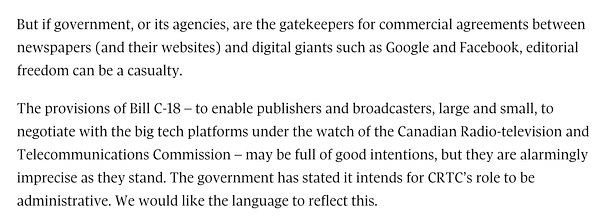The Globe and Mail finally broke from the media sector lobby with an editorial from publisher Phillip Crawley over the weekend calling for changes to Bill C-18. While some have argued that the Globe is trying to have it both ways by benefiting from legislation without facing regulatory obligations, my thread argues this has been a long time coming and that it doesn’t require much reading between the lines to see its broader discomfort with the government’s bill.

A few observations on the @globeandmail speaking out critically on Bill C-18. I believe they’re saying what many are thinking: the bill is a risky way to support the sector, driven largely by a few vocal lobby groups. A thread… 1/9

The Globe and Mail @globeandmail

While the Globe says it supports the principle of Bill C-18, its discomfort has been obvious for months. Unlike @postmedia & @Torstar, it hasn’t embarrassingly turned over its editorial to support it or devoted its front page to lobbying for it. 2/9

The Globe and Mail @globeandmail

The best the media lobby could have hoped for was for it to remain silent. It did until Saturday with a piece that doesn’t require much reading between the lines to see it doesn’t really agree with the principle of Bill C-18 either.
3/9

The Globe and Mail @globeandmail

Some have argued it just wants to avoid disclosure of private deals. But that’s true for all major media players. And Bill C-18 doesn’t publicly disclose the deals anyway as the government’s transparency claims are vastly overstated.
So why oppose?
4/9

The Globe and Mail @globeandmail

First, Bill C-18 involves unprecedented CRTC power into the news business without the jurisdiction to do so. This isn’t about quid pro quo of regulation because there isn’t CRTC regulation of newspapers. Sacrificing independence for Google/FB money is a big price to pay. 5/9


Second, the Globe clearly resents government intervening to support companies that have failed to successfully invest in digital and journalism, when it has done exactly that. There is a reason many digital news companies and the Globe didn’t support Bill C-18. 6/9


Third, the Globe points to the problem with a bill that is fundamentally about paying for links. Links shouldn’t require payment from platforms to the beneficiaries of those links (if anything, it’s the opposite) Without links there isn’t anything to pay for in Bill C-18. 7/9


Fourth, the Globe notes the focus on Google and Facebook misses the broader changes in platforms that influence both traffic and advertising. Those companies are convenient targets in Bill C-18, but don’t fully reflect the digital media ecosystem. 8/9


Fifth, Bill C-18 could take years to play out when there are big issues facing the industry now. The government promising fast action doesn’t reflect the reality of a bill that will require administrative hearings and likely face legal challenges. 9/9

Thanks for reading!
Find me on:



